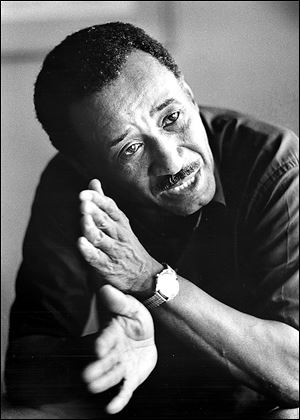
ALBERT MURRAY, 1916-2013
Writer battled black separatism
8/21/2013
Albert Murray challenged assumptions on art, race, and American identity.
NEW YORK — Albert Murray, an essayist, critic, and novelist who influenced the national discussion about race by challenging black separatism, insisting that the black experience was essential to American culture and inextricably tied to it, died Sunday. He was 97.
Mr. Murray was one of the last surviving links to a period of flowering creativity and spreading ferment among the black intelligentsia in postwar America, when the growing force of the civil rights movement gave rise to new bodies of thought about black identity, black political power, and the prospects for equality in a society with a history of racism.
As blacks and whites clashed in the streets, black integrationists and black nationalists dueled in the academy and in books and essays.
Mr. Murray was in the middle of the debate, along with writers and artists including James Baldwin, Richard Wright, Romare Bearden, and Ralph Ellison.
One of his boldest challenges was directed toward a new black nationalist movement that was gathering force in the late 1960s, drawing support from the Black Panthers and the Nation of Islam and finding advocates on university faculties and among alienated young blacks who believed they could never achieve true equality in the United States.
Mr. Murray insisted that integration was necessary, inescapable, and the only path forward for the country.
To those — blacks and whites alike — who would have isolated “black culture” from the American mainstream, he answered that it couldn’t be done.
To Mr. Murray the currents of the black experience — expressed in language and music and rooted in slavery — run through American culture, blending with European and American Indian traditions and helping to give the nation’s culture its very shape and sound.
With a freewheeling prose style influenced by jazz and the blues — Duke Ellington called him “the unsquarest man I know” — Mr. Murray challenged conventional assumptions about art, race, and American identity in books such as the essay collection Stomping the Blues and the memoir South to a Very Old Place. He gave further expression to those views in a series of autobiographical novels, starting with Train Whistle Guitar in 1974.
Mr. Murray established himself as a formidable social and literary figure in 1970 with his first book, a collection of essays titled The Omni-Americans: New Perspectives on Black Experience and American Culture. The book constituted an attack on black separatism.
“The United States is not a nation of black and white people,” Mr. Murray wrote. “Any fool can see that white people are not really white and that black people are not black.”
America, he maintained, “even in its most rigidly segregated precincts,” was a “nation of multicolored people,” or Omni-Americans: “part Yankee, part backwoodsman and Indian — and part Negro.”
The book also challenged what Mr. Murray called the “social science fiction” pronouncements of writers such as Richard Wright, James Baldwin, and Daniel Patrick Moynihan, who he said had exaggerated racial and ethnic differences in postulating a pathology of black life.
As Mr. Murray put it, they had simply countered “the folklore of white supremacy” with “the fakelore of black pathology.”
“The Omni-Americans,” novelist Walker Percy wrote, “may be the most important book on black-white relations in the United States, indeed on American culture,” published in his generation.